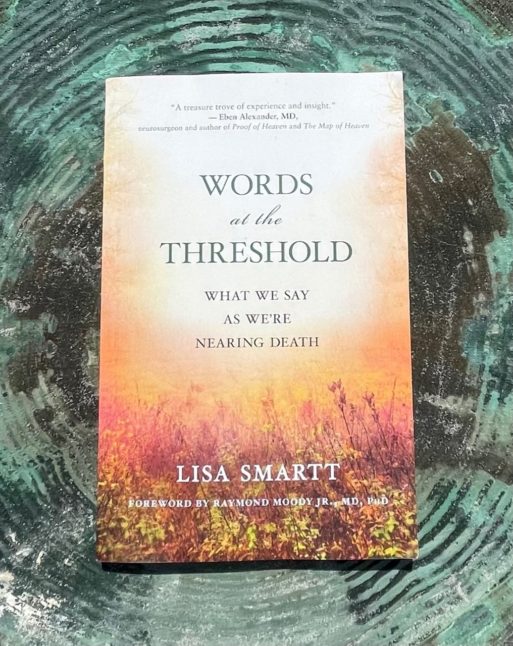
“Words at the Threshold” highlights linguistic themes shared by those dying.
“Words at a Threshold: What We Say as We’re Nearing Death.” examines the final idioms uttered from the lips of our dying loved ones. Author Lisa Smartt contends they may hold deeper meaning than mere words. Smartt’s father offered incoherent expressions during his final weeks on earth. His ramblings spurred Smartt to seek answers to the questions his odd phrases left behind. Smartt discovered that little research existed on stories or statements made by those at the threshold of death. This book is a culmination of her informal investigation she calls “The Final Words Project.”
The project is a collection of stories and cases studies from participants, who were asked to transcribe their loved one’s final declarations. It becomes obvious that language of the dying morphs into a language all its own. It changes from literal to nonsensical, conveying sensations that may be felt in different areas of the brain only tapped as we approach death. Angel visions, metaphorical references, and illogical phrases are common themes. Smartt interviewed family, friends, health care providers, hospice workers, and researchers to unravel the mysteries behind this phenomenon.

Lisa Smartt
Credit: Final Words Project
Smartt offers examples of the concept she calls, “metaphors of the momentous.” This is where the line between the metaphor and reality are blurred. A woman requests her best dress and shoes be brought to the hospital to attend a grand ball. A man claims he must go play golf with his friends. Both ultimately die the same day.
Sometimes it is not circumstance but changing conditions that are the familiar tone in the metaphor. Phrases like “the big storm is coming” or “the tide is turning.” Both are also key examples of foreshadowing one’s own death. Transcripts reveal repeated themes as a continuous narrative unfolds and the metaphor intensifies over time. Here is one example a woman shared of her great uncle in the weeks preceding his death:
March 10: “There’s these guys playing poker, and they want me to be the fourth hand. I told them I don’t want to play.
March 15: They’re telling me I have to play, and I just don’t want to.
March 20: I don’t have no choice now, do I? They are drinking and smoking. I don’t think I should be playing with them.
March 30: It’s okay. I don’t have much choice anyway. I’ll get out of my old chair here and sit with them.

Deathbed language may be
similar to that of dreams
Smartt says there may be hidden meaning in babbling or situational nonsense if we listen with our hearts instead of our minds. Sometimes, we can make a connection inside that other realm with our loved one. A dying husband yelled aloud to turn down the radio (which was not playing in reality). The wife responded, encouraging him to find the knob and turn it down. After a moment of silence, the husband declared, “Oooooohhhhh that is so much better, it worked, thank you.” And they sat together in comfort and silence.
Smartt believes that humans are hardwired for transcendent experience at the end of life. And “Words at the Threshold” encourages the observer to find meaning in what is seemingly unintelligible. A hospice chaplain offers readers some advice at the close of her book: “The dying need us to be exceptional listeners in order to be understood. The language of the dying is comprehended best when taken in through the gill of our hearts. Each syllable is sacred and should be received as a gift.”
And this book is a gift to all those who have or will lose a loved one.

 “Words at the Threshold: What We Say As We’re Nearing Death” by Lisa Smartt
“Words at the Threshold: What We Say As We’re Nearing Death” by Lisa Smartt


 First the Wealth Gap, Now the U.S. Has a Growing Health Gap
First the Wealth Gap, Now the U.S. Has a Growing Health Gap
 How to Comfort A Dying Loved One
How to Comfort A Dying Loved One
 Our Annual Seven Holiday Gifts for Someone Who Is Grieving, 2024 Edition
Our Annual Seven Holiday Gifts for Someone Who Is Grieving, 2024 Edition














